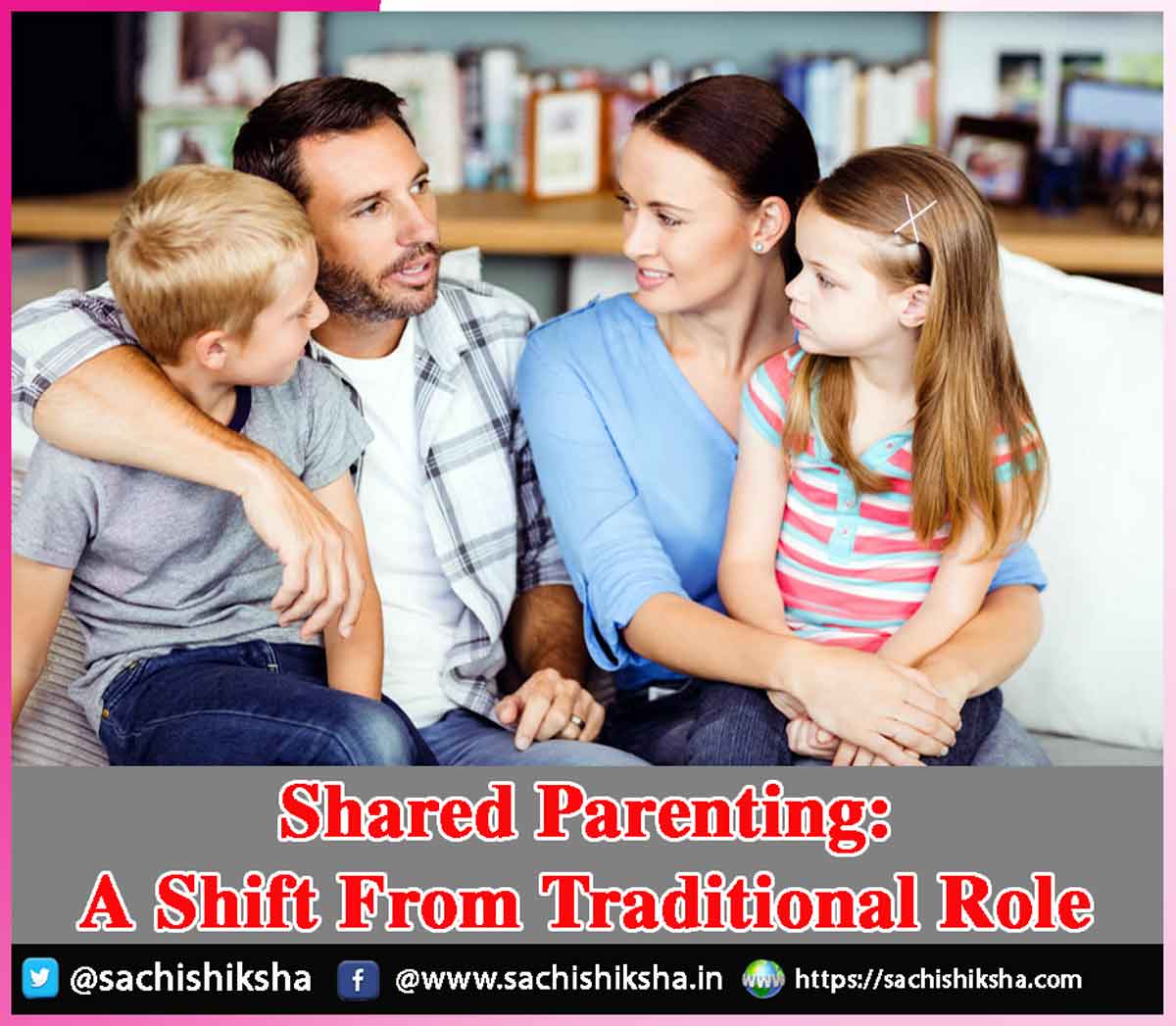Shared Parenting: A Shift From Traditional Role
Introduction: For centuries, parenting has been largely rooted in traditional frameworks. These frameworks were based on rigid roles, moral obligations, cultural values, and societal expectations. In most parts of the world, traditional parenting emphasized discipline, respect for elders, obedience, and clearly defined roles between parents and children.
However, in 2025, this once widely accepted model has been significantly transformed. Driven by technological innovation, shifting cultural values, evolving gender roles, and growing awareness of children’s mental health, parenting has taken on new forms. While some elements of traditional parenting persist, many families are moving towards models that emphasize emotional intelligence, collaboration, and adaptability.
Table of Contents
1. Understanding Traditional Parenting

Key Features of Traditional Parenting
- Strict Discipline: Physical punishment and tough consequences were considered necessary tools for raising obedient and responsible children.
- Respect for Elders: Children were expected to comply without questioning adult directives.
- Gender-based Roles: Fathers were decision-makers and enforcers; mothers were caregivers and moral instructors.
- Cultural Transmission: Values such as honor, hard work, and loyalty to the family were imparted without challenge.
- Community support: Extended family and community elders played a role in child-rearing, especially in collectivist cultures.
These methods were shaped by necessity. In agrarian or industrial economies, families worked as units. Obedience and duty ensured survival and cohesion. However, while this structure fostered discipline and community respect, it often came at the cost of emotional expression and psychological freedom.
-
Forces That Have Transformed Parenting
The 21st century, particularly the last two decades, has witnessed dramatic social and technological changes. By 2025, parenting has evolved under the pressure of multiple global shifts:
Technological Advancement
The rise of the internet, smart phones, and social media has redefined how families interact. Children are growing up as digital natives, often more tech-savvy than their parents. This shift has created:
- Information Overload: Parents now have access to conflicting advice from experts, influencers, and forums, challenging inherited wisdom.
- Screen Culture: Children spend more time online, requiring parents to navigate issues like digital boundaries, online safety, and content regulation.
- Remote Work: Work-from-home culture has blurred boundaries between professional and parenting roles.
Psychological Awareness
Over the past decades, child psychology has emphasized the importance of attachment, emotional regulation, and mental health. This has led to:
A change in parenting approaches from strict to powerful and attentive.
The emergence of gentle parenting, focused on empathy, boundaries, and emotional literacy.
Changing Gender Roles
The traditional model of the stay-at-home mother and working father is no longer dominant. By 2025:
More dual-income households exist than ever before.
Fathers are increasingly involved in childcare and emotional support.
LGBTQ+ families have broadened the definition of family and parenting dynamics.
Shared domestic responsibilities have altered power dynamics within families.
Cultural Shifts and Globalization
Exposure to diverse parenting models through media and migration has reshaped family practices:
Immigrant families often face cultural dissonance, balancing tradition with assimilation.
Global education and values such as individualism and self-expression are challenging collectivist and obedience-based approaches.
Economic Pressures
Parenting in 2025 is also influenced by economic uncertainty, inflation, and housing crises in many countries. These pressures have:
Increased parental stress and burnout, created multi-generational households, complicating parenting dynamics and pushed parents to emphasize skills like adaptability and creativity over traditional conformity.
-
Modern Parenting Styles in 2025
In contrast to traditional parenting, modern styles emphasize the child’s voice, autonomy, and psychological well-being. Some of the dominant trends include:
- Gentle Parenting: This approach centers on empathy, respect, and understanding. Rather than punishment, it uses reflection, conversation, and natural consequences to guide behavior. It aims to raise emotionally aware, self-regulating children.
- Authoritative Parenting: Different from authoritarian styles, authoritative parents set clear boundaries but remain warm, responsive, and communicative. This style has been linked to higher academic achievement and emotional health.
- Conscious Parenting: This modern philosophy encourages parents to become self-aware and understand their own triggers and patterns. The focus is on mutual growth—parents evolve alongside their children.
- Free-Range and Home-Schooling Movements: Some families are rejecting institutional norms altogether. They allow children to explore freely, take risks, and engage in self-directed learning. These methods, despite their controversy, show an intention to rebuild faith in kids’ natural drive.
- Digital Parenting: In 2025, parenting includes monitoring digital footprints, managing screen time, teaching cyber-safety, and guiding online behavior—tasks unheard of in traditional parenting.
Generational Conflict and Cultural Dissonance
The evolution of parenting styles has also created tension between generations. Grandparents often struggle to understand or accept the newer approaches taken by their children. Common points of friction include:
- Discipline vs. Empathy: Older generations may view gentle parenting as permissive.
- Authority vs. Autonomy: Traditional elders may interpret a child’s voice as disrespectful.
- Technology Use: Grandparents might not grasp the digital ecosystem children inhabit.
- Family Roles: In some cultures, a decline in extended family involvement challenges elders’ sense of relevance.
For immigrant families, this conflict can be acute. Parents trying to raise children in a Western context may clash with their own traditional upbringing. The result is a delicate balancing act: preserving cultural heritage while adapting to a changing environment.
-
The Challenges of Modern Parenting
Although modern parenting offers many benefits, it is not without criticism. Some of the key challenges include:
- Lack of Boundaries and Structure: Without a clear framework, children may struggle with limits and discipline. Critics argue that too much negotiation undermines respect and authority.
- Parental Burnout: Modern parents are expected to be emotionally available, financially stable, informed, and digitally literate. The pressure to “do it all” has led to rising burnout, anxiety, and depression among parents.
- Over-reliance on Technology: Some parents accidentally reduce in-person engagement by using electronic gadgets as teachers. Kid’s dependency on screens is becoming a major issue.
- Inconsistent Parenting: With so much information available, parents sometimes swing between different styles, leading to confusion and instability for children.
- Loss of Community Support : The decline of close-knit communities has left many parents isolated. In contrast to traditional parenting where extended families were involved, many modern parents shoulder the burden alone.
-
Hybrid Parenting: Blending Tradition and Innovation
Many families in 2025 are discovering a middle path—combining the structure of traditional parenting with the sensitivity of modern methods. This hybrid approach may include:
- Setting firm boundaries while explaining the reasons behind them.
- Encouraging independence while maintaining strong family values.
- Respecting elders without suppressing the child’s voice.
- Using digital tools for education while fostering offline creativity and interaction.
Hybrid parenting recognizes that no single method fits all. While adjusting to modern circumstances, it respects the knowledge of tradition.
-
The Future of Parenting: What Lies Ahead
Parenthood will keep on shifting as the twenty-first century progresses. Key trends to watch include:
- Tech-Augmented Parenting: AI tools, virtual reality, and smart home devices are being integrated into child-rearing practices. Apps for emotional tracking, educational games, and even AI companions are reshaping how children learn and interact.
- Gender-Neutral Parenting: More families are choosing to raise children without imposing strict gender norms. Toys, language, and responsibilities are selected based on interest, not gender.
- Global Citizenship and Ethics: Parents are emphasizing empathy, sustainability, and cultural awareness, preparing children for a globalized world.
- Reclaiming Cultural Identity: While some traditions are fading, others are being consciously revived. Storytelling, rituals, and language are reintroduced to connect children with their roots in a more balanced way.
Conclusion
Parenting in 2025 is vastly different from the model that governed families a generation or two ago. While traditional parenting emphasized authority, obedience, and structure, modern parenting leans towards empathy, autonomy, and adaptability. The change has been fueled by technological advances, psychological research, shifting gender roles, and cultural diversity. However, this shift is not a rejection of tradition but an evolution of it. The best parenting models today are those that thoughtfully blend the values of the past with the insights of the present. They prepare children not only to survive but to thrive in a complex, fast-changing world.
The challenge for parents in 2025—and beyond—is to stay rooted in compassion, open to learning, and willing to adapt. In doing so, they not only raise well-rounded children but also redefine what it means to be a parent in the modern age.














































